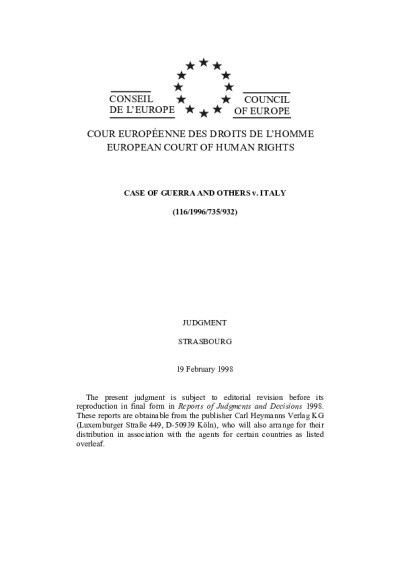
Date
Geographical Area
Europe
Countries
Italy
Keywords
Jurisdiction
European Court of Human Rights (ECHR)
Case Name
Guerra & Ors v. Italy
Case Reference
Application no. 116/1996/735/932
Name of Court
European Court of Human Rights
Key Facts
This case was referred to the Court on 16 September 1996. The applicants lived in a town called Manfredonia situated close to the Enichem Agricoltura company’s chemical factory. The factory which produced fertilisers and caprolactam was classified as “high risk” according to Presidential Decree no.175 of 18 May 1988.
Residents of Manfredonia applied to the Foggia Magistrates’ Court complaining that the air was polluted by emissions from the factory. Criminal proceedings were brought against seven company directors for offences relating to the pollution. Two directors were sentenced to five months’ imprisonment and a fine of two million lire. The Bari Court of Appeal subsequently acquitted the directors on the ground that the offence had not been made out and the errors the directors were alleged to have made were attributed to delays and uncertainties in adoption and interpretation of regulations.
The applicants relied on Article 2 ECHR, submitting that the lack of practical measures to reduce pollution infringed their right to respect for their lives and physical integrity. They also complained that their right to freedom of information per Article 10 ECHR was infringed since the authorities failed to inform the public of the risks as required by Presidential Decree no.175/88; and that their right to respect to private and family life was violated by the severe pollution in the town.
Residents of Manfredonia applied to the Foggia Magistrates’ Court complaining that the air was polluted by emissions from the factory. Criminal proceedings were brought against seven company directors for offences relating to the pollution. Two directors were sentenced to five months’ imprisonment and a fine of two million lire. The Bari Court of Appeal subsequently acquitted the directors on the ground that the offence had not been made out and the errors the directors were alleged to have made were attributed to delays and uncertainties in adoption and interpretation of regulations.
The applicants relied on Article 2 ECHR, submitting that the lack of practical measures to reduce pollution infringed their right to respect for their lives and physical integrity. They also complained that their right to freedom of information per Article 10 ECHR was infringed since the authorities failed to inform the public of the risks as required by Presidential Decree no.175/88; and that their right to respect to private and family life was violated by the severe pollution in the town.
Decision and Reasoning
The Court referred to Article 10 noting that it imposes on States not just a duty to make information available to the public on environmental matters but also a positive obligation to collect, process and disseminate such information. The Court referred to case-law regarding the right to receive information and distinguished the present case. The Court reiterated that freedom to receive information, Article 10(2), prohibits a government from restricting a person from receiving information that others wish or may be willing to impart to him but that freedom could not be construed as imposing on a State, in this case, positive obligations to collect and disseminate information of its own motion.
The Court then considered the alleged violation of Article 8 ECHR and whether the national authorities took the necessary steps to ensure effective protection of the applicants’ right to respect for their private and family life. The Court held that severe environmental pollution may affect individuals’ well-being and prevent them from enjoying their homes in such a way as to affect their private and family life.
The Court then considered the alleged violation of Article 8 ECHR and whether the national authorities took the necessary steps to ensure effective protection of the applicants’ right to respect for their private and family life. The Court held that severe environmental pollution may affect individuals’ well-being and prevent them from enjoying their homes in such a way as to affect their private and family life.
Outcome
Held: i) Article 10 was not applicable, and ii) there was a violation of Article 8. It was also held that it was unnecessary to consider the case under Article 2. The Court ordered that the respondent State pay each of the applicants, within three months, 10,000,000 Italian lire in respect of non-pecuniary damage.
Link
Disclaimer
This case law summary was developed as part of the Disaster Law Database (DISLAW) project, and is not an official record of the case.
Document
Document